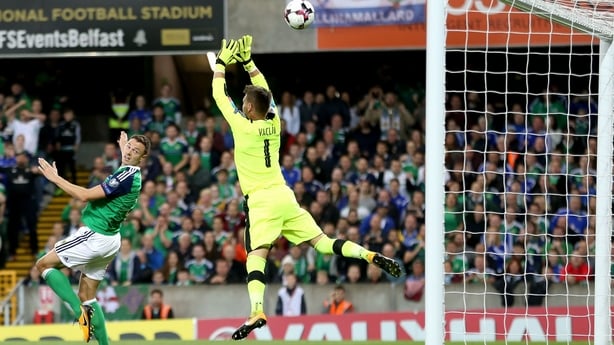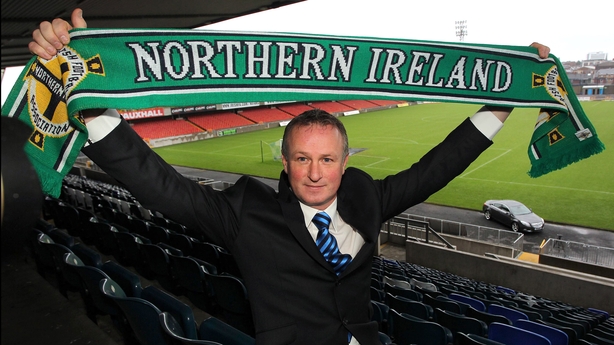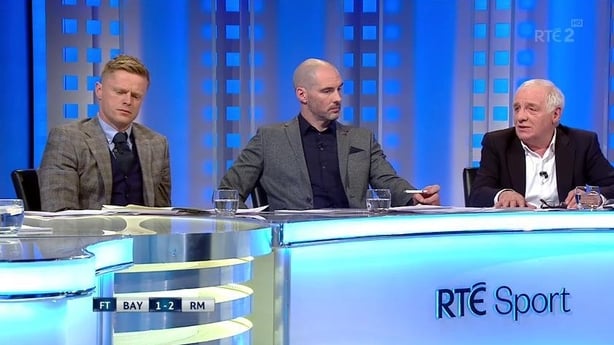When the final whistle went at the Aviva Stadium on Tuesday night there was no mass outpouring of anger.
The Republic of Ireland had just suffered a defeat against Serbia that looks to have all but ended their hopes of qualifying for next summer’s World Cup automatically but the atmosphere was one of muted resignation.
In many ways it seemed that the 1-0 defeat was the result that supporters expected. Much of the talk in the build-up to the game centred around how the Aviva Stadium crowd could play a big role and roar their side to victory.
They gave it a good go too, from the first whistle supporters were firmly behind their team cheering every challenge and every half-chance but as soon at Aleksandar Kolarov opened the scoring in the second-half with his close range rocket, that was it.
All belief drained from the Irish crowd and - it appeared - from the Irish players. Despite Serbia being reduced to 10 men and Martin O’Neill’s best efforts to change things, his players were unable to fashion a single clear-cut opportunity.
The belief that has taken this Irish team to landmark victories over Germany and Italy was nowhere to be found either on the pitch or in the stands and the game limped to its obvious conclusion. A far cry from ‘you’ll never beat the Irish’.
Contrast that to the scenes at Windsor Park the night before when Michael O’Neill’s Northern Ireland beat the Czech Republic 2-0.

It was a result that virtually guaranteed Northern Ireland a play-off place for Russia 2018 and one which, mathematically at least, still leaves them with a chance of pipping Germany to top spot in Group C.
They’ll most likely have to settle for a second place finish but that should not take the gloss off what has been a remarkable qualifying campaign. Third seeds and placed in a group with Germany, Norway, the Czech Republic and Azerbaijan, few gave O’Neill’s side a chance of progressing to Russia.
However Northern Ireland have gone about their business in some real style. Following a mixed start to their campaign in which they drew with the Czechs, beat San Marino and lost to Germany, they have since embarked on a five-match winning run, during which they avoided conceding a single goal and scored 12 times.
Indeed the only goals that they have conceded in this campaign came in that 2-0 defeat away to Germany.
So why the big difference between the two teams from this island? On paper at least, the Republic should hold the advantage. They have a vastly more experienced manager, a slightly better playing squad and arguably had an easier qualifying group.
Why has Michael O’Neill’s side flourished when Martin O’Neill is now hoping to snatch second place and then hoping that the Irish points total will be enough for a play-off spot?
The two teams play in a similar set-up. It’s safety first for the most part, with success built on a strong defence and making the most of their opportunities when they arise. The problems have developed for Martin O’Neill in this campaign when those opportunities haven’t been taken.
After a dream start to the campaign in which they sat top of Group D by taking 10 points from the first four games things have slipped away badly for Ireland who won just three points from the last four games.
Goals have dried up and that’s the crux of the problem. Three goals from four games tells its own story, while Northern Ireland have hit the net eight times in their same time period.
When you get down to it, there’s no major difference in terms the approach of the Republic of Ireland and Northern Ireland, and indeed what may well turn out to be defining games of both of their campaigns, tell a similar story.
Possession: overrated. #GAWA pic.twitter.com/Wg1rOztlUR
— James Irwin (@nornirontoffee) September 4, 2017
In Ireland’s 1-1 draw with Georgia they set up in a 4-5-1 formation. They struggled to hold onto the ball, winning just 31% of possession and managing 6 attempts on target – the majority of which came from dead balls.
Despite the contrast in results, Northern Ireland’s 2-0 victory over the Czech Republic followed a similar pattern. They too set up in a 4-5-1, and they struggled to get on the ball, with the Czechs enjoying 72% of the play and the hosts managing just two shots on target.
The big difference was that they made those efforts on goal count. Jonny Evans and Chris Brunt both found the net and that was enough to give them victory and guarantee them a second place finish in Group C.
It hasn’t always been plain sailing for Michael O’Neill with Northern Ireland. The former Shamrock Rovers manager took over the Northern Ireland job on the strength of his achievement with Rovers and in making them the first League of Ireland side to qualify for the group stages of European competition.
O’Neill took charge of the North with the team at a low ebb and he didn’t get off to a great start. His first game in charge saw his side lose 3-0 to Norway and they followed that up with a 6-0 defeat against the Netherlands.
It would take O’Neill eight more games before he had his first win as Northern Ireland manager and then it would take his side another nine games before they won again. A record of one win in his first 18 games is one that would see most other international managers sacked, not so O’Neill.

He was afforded time and patience by the Irish Football Association and supporters alike and they’re reaping the rewards now.
It’s almost impossible to imagine that a Republic of Ireland manager would be granted that kind of time or allowed to continue in their job with that kind of record. Likewise it’s difficult to see the Republic fanbase accept a manager with O’Neill’s limited managerial experience.
Dundalk manager Stephen Kenny is often touted as a potential Ireland manager by League of Ireland supporters given his success with the Lilywhites but the wider national team support base would struggle to accept him.
Expectations are higher among the Republic of Ireland team supporters, and there’s no chance a manager like Kenny would be shown the kind of patience that O’Neill enjoyed in the early days at Northern Ireland.
One win in 18 games simply wouldn’t happen because the manager would have been replaced long before it got to that stage. Consequently no Republic of Ireland manager will ever be granted the time to come in and build an international team from the foundations up, in much the same way the Northern Ireland boss did.
Indeed it’s hard to see how Northern Ireland would allow a manager like Michael O’Neill to thrive now. Expectations have been raised by their European Championship qualification and this World Cup campaign that a manager with a record of one win in 18-games would be out on his ear.
With added expectation comes added pressure and Michael O’Neill is fortunate enough to have avoided that for the most part. While Martin O’Neill’s every move and decision is scrutinised and analysed in depth, his Northern Ireland counterpart is afforded more freedom.

There’s no Northern Irish equivalent to Eamon Dunphy poring over every selection call and tactical decision and stridently challenging the manager's methods and motives.
Indeed it often takes someone from outside of the Irish bubble to point out just how unusual the pressure that Dunphy can bring to bear on a manager.
Robbie Savage may not be known as a great football intellect but occasional the odd worthy morsel can slip out as it did in the wake of Ireland’s defeat to Serbia when Savage sparked a mini-social media furore by questioning just who Dunphy was and just what he talking about as he criticised O'Neill.
Under a caption of Dunphy on the RTÉ panel, Savage tweeted: "In Ireland... great result for Wales! Just listening to this guy on TV talking nonsense about @FAIreland performance... who is he?!!"
For a man who works in the cut-throat English soccer media, who have less patience than most for their international managers, this was a striking reminder that Dunphy’s over-the-top criticism isn’t what most managers have to cope with.
Every single Irish manager from Jack Charlton onwards has felt Dunphy’s wrath and it’s an added pressure that a manager like Michael O’Neill just doesn’t have to deal with.
Dunphy, however, is reflective of the national mood. Where Michael O'Neill is extracting the maximum from his limited player base, the sense in the Republic is his namesake is failing to do likewise.
Should the Republic fail to qualify for the World Cup, the presence of the other Irish team in Russia will only help to highlight these frustrations.


